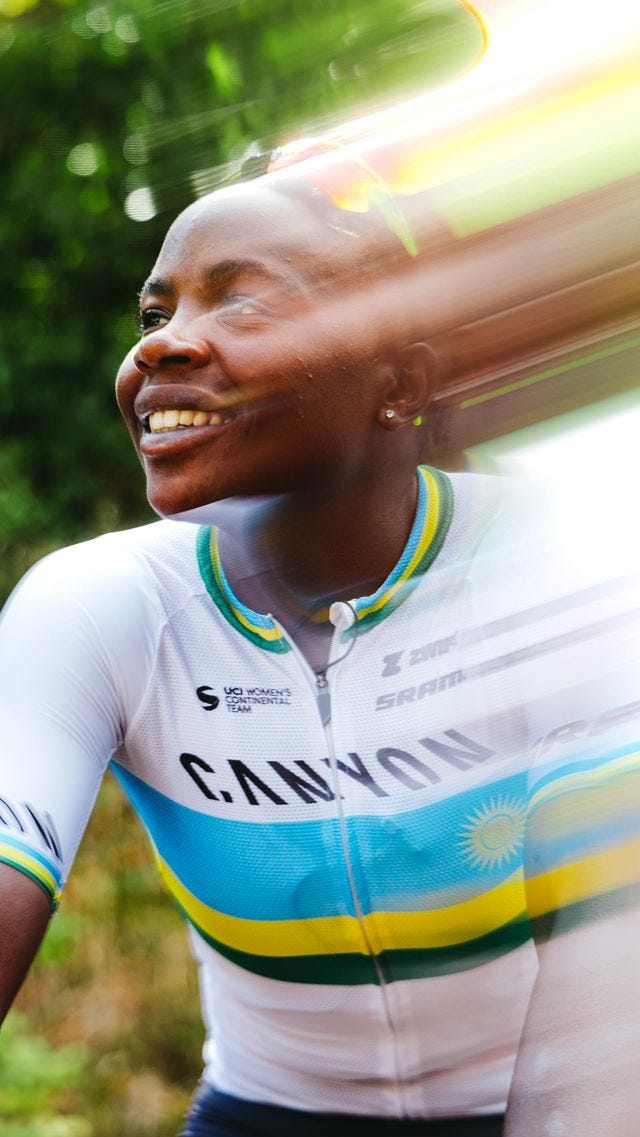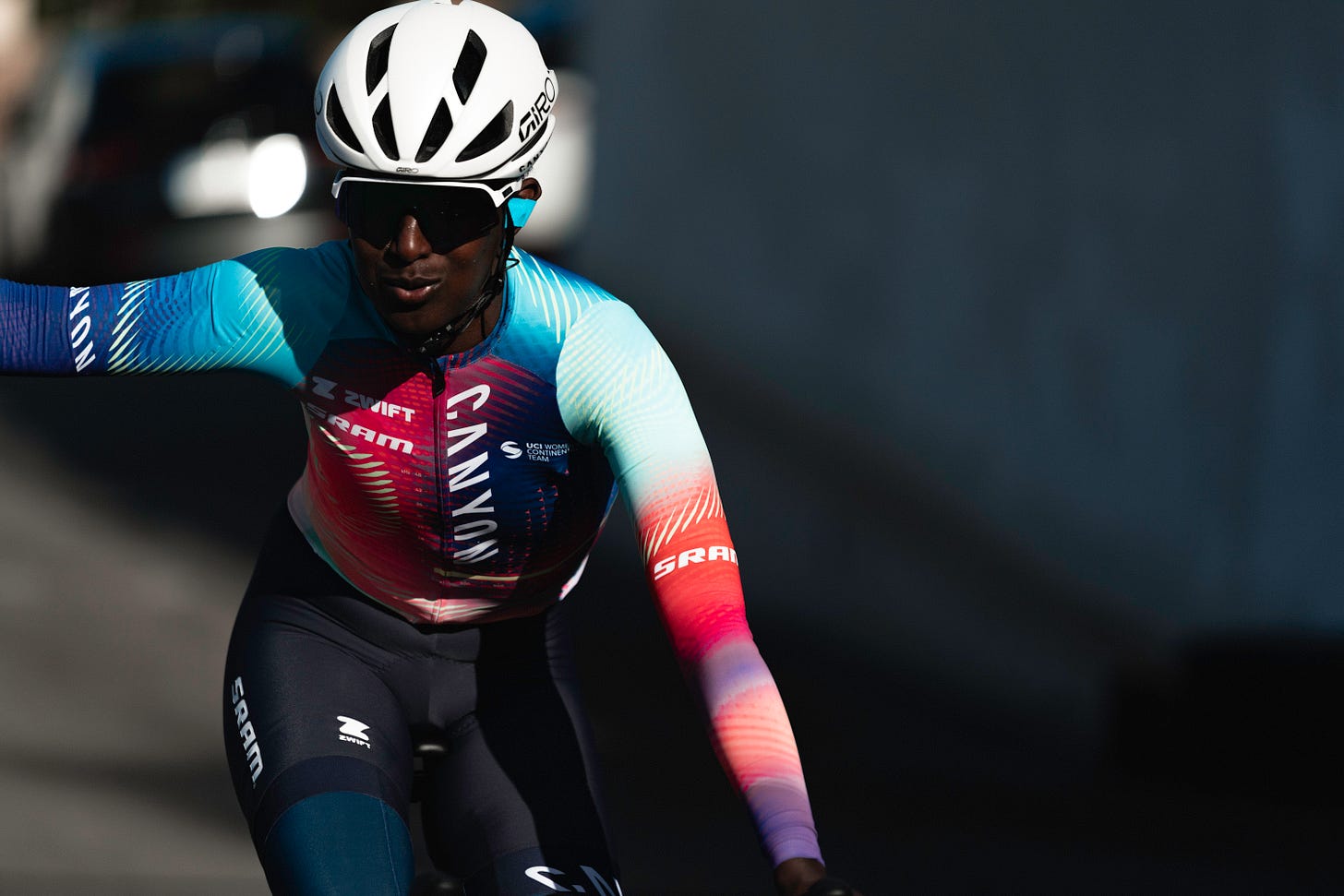'We create an entry level' - Canyon//SRAM Generation providing a pathway for those who have none
Interview with DS Adam Szabo on how the team is developing riders from under-represented backgrounds
Professional cycling’s push for diversity requires investment from all angles. The strongest tides constantly pull the sport back towards its western European heritage, whether that be because of financial pressure, cycling popularity or immigration systems.
However, there is a sea of talent and passion for the sport outside of the nations already heavily represented in the WorldTour. They are waiting for an opportunity.
The UCI have set out an agenda to make the sport a more global one, but need support from major teams, who hold the majority of the power and money to make things happen.
Perhaps the most progressive collaborators in that effort are the Canyon//SRAM women’s WorldTour team. In 2022, the German-registered outfit launched their development arm, Canyon//SRAM Generation, which aims to “help talented female athletes from diverse backgrounds reach the top of professional cycling and to help them break new ground for their future and the future of cycling,” according to the team’s website.
Since their inception, the squad has feature riders from 15 different nations, including Nigeria, Jamaica, Uganda and Paraguay.
“We create a kind of entry level for the riders who need to have development,” Adam Szabo, who has been the team’s DS since 2022, tells me during an interview for a Cyclingnews feature. “Potentially then they can move on to the higher level of cycling. This is the main idea why we started this team.”
The team have recently announced several renewals ahead of the 2025 season, including Ethiopian Selam Gerefiel, South African Maude le Roux and Nigerian Ese Lovina Ukpesaraye. More signings are expected in the coming days and weeks.
Read more: How the UCI World Cycling Centre is aiming to globalise cycling
Also expected to re-sign is Rwandan rider Diane Ingabire, who Szabo says has been one of the team’s success stories in her two seasons in Europe, despite a slower start than most.
“It takes her a little bit longer, but I think now she understands cycling after two years. It goes hand in hand with her knowledge of English, because often the riders, especially her and the Rwandans, don't really speak English when they're coming to Europe,” Szabo says.
Ingabire, who is gearing up for a home World Championships in 2025, impressed with a strong showing at the Gran Premio Igartza last season and even more so this year with some strong riding at September’s Tour Feminin l’Ardeche.
“The other, which is even a bigger success story,” Szabo says, “is Ese from Nigeria, Ese Lovina. Her outgoing personality pushes us and motivates us and gives us a reason to do it even more.”
Nigerian Ese Lovina Ukpesaraye won her contract with Generation after becoming African Continental Champion in 2023. She showed a flash of potential at Veenendaal-Veenendaal in May, finishing 14th in a top class field.
Although the team is enthused by the progress being made with these riders, no rider from an under-represented background has yet been promoted to the Canyon//SRAM WorldTour squad in the team’s first seasons.
Szabo says that the team has taken time to develop and are learning as they progress. Informed recruitment was a real challenge for the team early on, but is something they have worked on.
When assessing a rider from an established cycling background, scouting is easy. Ask them to send over their power files, have a conversation and the team can make their decision. It’s not so easy with riders from lesser-established backgrounds, as Szabo has found out. Often riders don’t train with power-meters despite being perhaps the best from their country and communication can be challenging.
Read more: Spotlight on the Caribbean - how pro cycling is growing in the region
Szabo has also had to deal with a range of attitudes and approaches when riders make it to Europe to race with the team.
“When we started, we didn't really find the riders with the correct motivation. On many occasions, we saw that if we took a rider, the riders from these countries saw that this is like a final destination for them, and they made it,” Szabo says.
“Then they kind of lost the motivation throughout. They were seen in their countries as superstars, and they were seen as riders who made it to Europe. But actually, it's just the beginning of the journey, it's not the end. And this is what they, I don't think they understand it correctly.”
“This is not what we would like to see. On the contrary we already had some some nice surprises when actually the motivation of the riders keep pushing us that they want to be better every day and want to understand more about cycling.”
For many riders who have come through the Generation setup, the journey has already been long to get to Europe. In some cases, this attitude is understandable. But when the vision of the team doesn’t match the vision of the rider, significant progress is impossible.
The visa challenge
As one might expect, with the team signing riders from a variety of nations around the world, visas have presented a real problem. Several riders who signed contracts for Canyon//SRAM Generation over the years never got to race with the team at all, due to not obtaining a visa. This season, young Ugandan Florence Nakagwa was unable to race in Europe due to an unsuccessful visa application.
“Looking into more long-term visas and even to residency permits are really challenging because the European countries or the countries where we are operating from they don't want to have other peoples coming into their country.”
Szabo says that he has become something of an expert in visas and has spent a great deal of time over the last few years trying to get his athletes access to Europe.
“The main job is that you need to convince them why you want to have those riders or those people here in Europe,” he says.
Part of the problem, Szabo says, is that communication with national federations, who often play a key role in the visa process, is complex and unreliable. He says that riders have missed key races just because a federation withheld information, didn’t communicate as it should or failed to file paperwork.
“Being now three years into dealing with some federations, it’s extremely hard with the bureaucracy that they have placed there. Even in a super easy thing, like letting the riders to go to Continental Champs or arranging flights or visas to travel for them, even within Africa.”
“The federation and the bureaucracy is so complicated. And when a foreign team from Europe turns up, everybody wants to be part of it - also in the federations. They see it as an opportunity for themselves to shine or to do something, but not in a positive way.”
Szabo thinks that visas are one of the main reasons why the sport as a whole is not more diverse. He suggests that the UCI could get more involved in lobbying for visas for international riders.
“I don't want to blame or just to put pressure on the UCI, but if we look into it maybe the UCI, through the International Olympic Committee, like say that this rider is actually a rider…the embassy will issue the visa easier…but nobody has that magic paper to just go into an embassy and they will say ‘Oh, it's all fine. We'll issue the visa for you’.”
Canyon//SRAM Generation’s work is commendable, but clearly to move the needle further more teams will need to follow suit and invest in the globalisation of the sport.
Szabo’s role will change for 2025, as he takes up a more senior position within the WorldTour squad. Generation however will continue its push for diversity and the team as a whole remain committed.
“Going forward, we're trying to have stability in the team always,” Szabo says. “So most of the riders will stay and especially the riders from Africa will stay another year.”
“We're trying to build on the learnings and what we did with the riders this year.”
Thanks for reading Global Peloton!
The best way to support Global Peloton is to add a paid subscription. Your subscription enables me to bring you more international cycling news and stories.
If you enjoyed this post, please consider subscribing and sharing.
Or, you can Buy Me a Coffee







